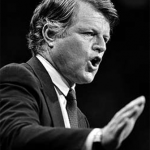
Mr President, I am pleased to join with Senator Abraham Ribicoff in introducing a Senate resolution calling for the immediate withdrawal of British troops from Northern Ireland and the establishment of a united Ireland. An identical resolution is being introduced today in the House of Representatives by Congressman Hugh Carey of Brooklyn.
We believe that the resolution states the only realistic means to end the killing in Northern Ireland and to bring peace to a land that has given so much to America, a land that has done so much to enrich the history of our own Nation, a land that is suffering so deeply today. The conscience of America cannot keep silent when men and women of Ireland are dying. Britain has lost its way, and the innocent people of Northern Ireland are the ones who now must suffer. The time has come for Americans of every faith and political persuasion to speak out. We owe ourselves and our sacred heritage no less.
Down through the centuries, the people of Ireland have been forced to wage a continuing and arduous struggle for freedom and equality. For generations, division and despair have scarred the countryside. The ancient right of self-determination has been denied. Often alone, often without notice from others throughout the world, brave men and women of Ireland have given their lives for the principles they hold dear. Millions have been driven from their homes, forced to leave the land they love obliged to seek a new life in nations where the yoke of repression could not reach.
Today, the Irish struggle again. But now, they are not alone. They have the support of free peoples in every corner of the world. Their cause is just, and the reforms they seek are basic to all democracies worthy of the name. The crisis now, however, is especially serious, because the hate and bitterness are taking a new and far more drastic turn. Ulster teeters on the brink of a civil war that threatens to engulf all of Ireland. The Government of Ulster rules by bayonet and bloodshed. The struggle today in the ghettos of Londonderry for liberty and the right of self-determination, for principles that should be the birthright of all peoples who call themselves free men.
In recent months, we have witnessed appalling outbreaks of civil strife in Northern Ireland, the worst in the entire half-century since Ireland was partitioned. The soaring toll of death and violence is uncontrolled. Thousands flee their homes in terror. Businesses are bombed, and factories close down. Barbed wire roadblocks imprison every street corner. Young children stand on curbstones and shout shrill insults filled with hate. A child is slain returning from an errand for his parents. A priest is killed as he kneels over a desperately wounded victim. A lorry backfires, and the driver is cut down in a wanton hail of military bullets…
I have said many times in the past that the basic issue in Northern Ireland is human rights. Until the minority enjoys equal rights with the majority, peace cannot come to Northern Ireland. Equality is the only instrument to erase the hatreds nurtured by years of fear, repression and mistrust. Americans well know that injustice breeds bitterness, and that from this bitterness can come violence at almost any provocation. America has learned that the solution is not repression, the solution is not armed troops, the solution is not barbed wire detention camps. We have found a better way, a way of peace and reconciliation, and we believe that Northern Ireland can reach the same result.
The heart of the solution we offer today is the call for immediate withdrawal of British troops from Ulster and the establishment of a united Ireland. Without a firm commitment to troop withdrawal and unification, there can be no peace in Northern Ireland. The killing will go on, and the intolerable mounting violence will continue…
Ulster is becoming Britain’s Vietnam. Indeed, it is fair to say that Britain stands toward peace in Northern Ireland today where America stood in Southeast Asia in the early nineteen sixties. The parallel is uncanny. When President Kennedy died, only 120 American soldiers had been killed in action in Vietnam between 1961 and 1963. This week we learned that 128 persons had died in Northern Ireland in the two years of bitter violence that has gripped that land since British troops first arrived in 1969. We know that the years from 1961 to 1963 were only an early chapter in the American horror of Vietnam. We know the tragedy that unfolded there in later years: 45,000 Americans have now died in the war; hundreds of thousands of North and South Vietnamese soldiers have been killed; millions of innocent civilians have died and millions more are homeless refugees in their own country.
Surely, if Britain sees and understands the parallel, we can avoid a repetition of Vietnam in Ulster. The most hopeful sign I see is the growing volume of press reports that the mass of British people themselves see the issue more clearly than their government. A recent poll, taken in September, reveals that fully 59 per cent of the British public wants to end the killing by bringing British troops home from Ulster now. Simple humanity demands no less. Without that step, no peace is possible, and there can be no settlement of all the other issues…”
